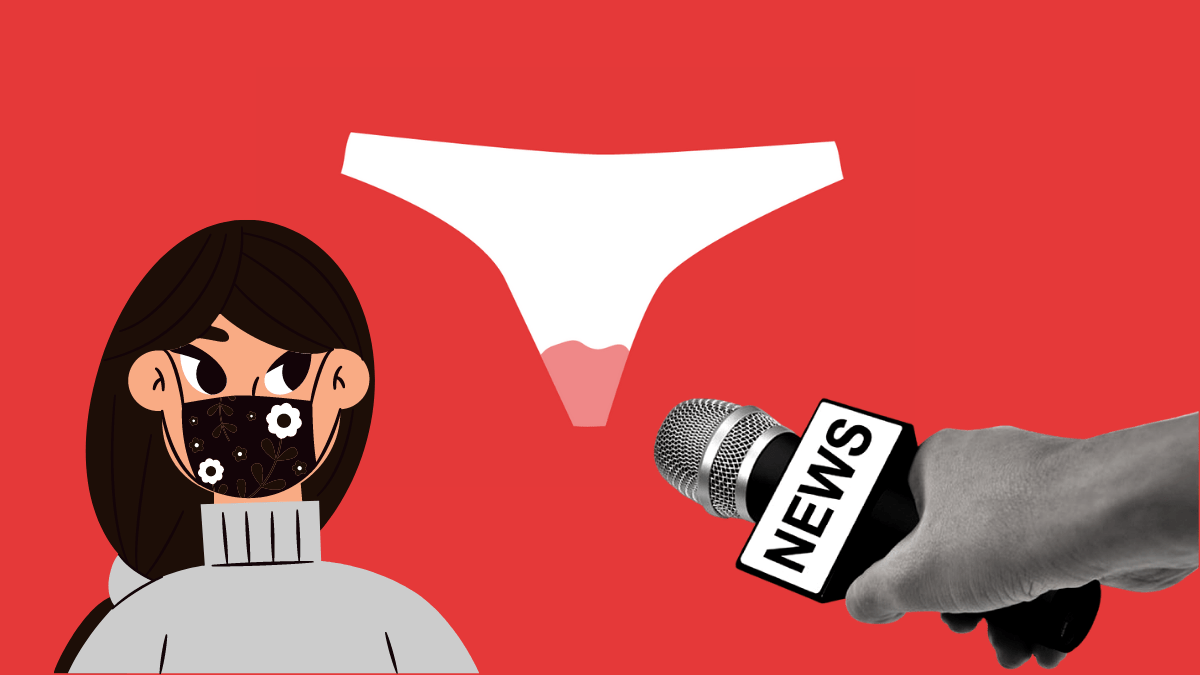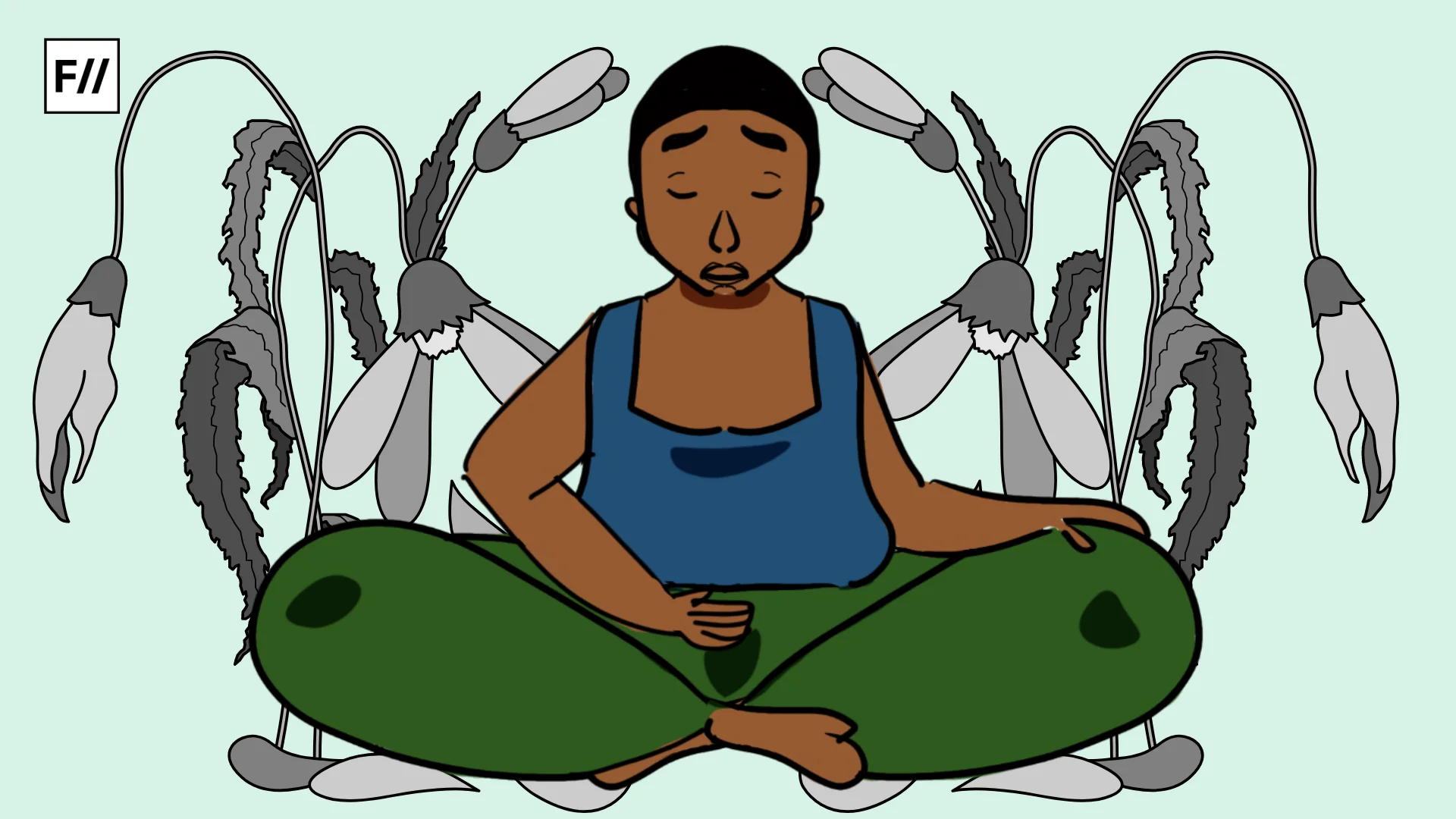The media has a huge role to play in the way people perceive the world around them. It keeps us in a constant loop, informing us of the ever evolving outlook and environment of our society. With the growing challenge of stepping out into the real world at this time, our collective dependency on the media only grows deeper.
This is why, it is imperative to look into how the media has covered menstruation during the pandemic. What sort of landscape has it painted?
Female Frontline Warriors
One of the most widely reported perspectives under the subject of menstruation was the female frontline workers, doctors and nurses’s experiences of going through their periods while working with a PPE kit on.
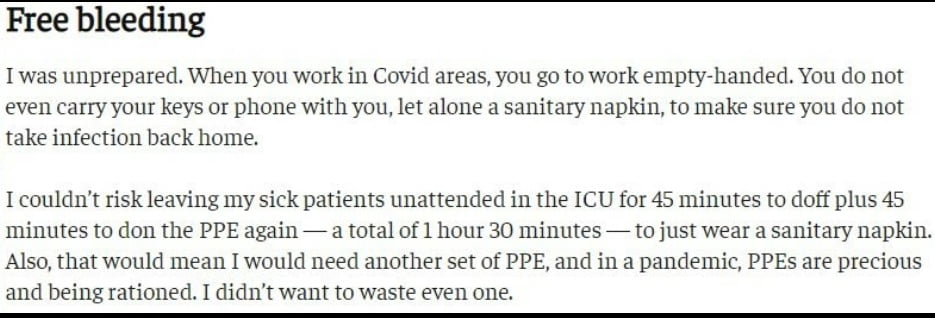
The story above, is an example of how the media gave women the platform to talk about their menstrual experience with its interconnections to the workplace and the exceptional practises that came with the pandemic. However, not all of these interconnections have completely received its due attention. The media has missed a golden opportunity to make use of the power of anecdotes to further explore and educate the readers about two glaring concerns.
- Lack of adopting a gendered approach to product designs
- Absence of menstrual policies in the workplace
This is why several articles released so far have explained to the reader why their cycle is irregular, however, have discussed very little about the effects of the same factors on menstruators living with disorders like PCOS, where irregular menstruation is a pre-existing characteristic; and others like PMS/PME where vulnerabilities are exacerbated due to change in lifestyle, stress, etc.
“Had there been no coronavirus pandemic, my female colleagues would have offered me sanitary napkins,...” the article stated above continues, “…my male colleagues would have told me to take it easy and take the day off. Because when you’re a doctor, surrounded by doctors, menstruation is not a taboo.”
But what about menstruating persons who belong to other professions?
Evidently, it is not so easy for all to take a day off as a result of mutual understanding within the workspace, whether it maybe pre-menstrual or during bleeding phase. It is so important to explore these angles that show themselves so effortlessly in these personal narratives.
Irregularity in Periods
The second major bunch of articles on the subject were around reported irregular period concerns in a larger number of menstruating persons. It was also reported that “unexpected irregularities in periods” was one of the top most queries that arises on tele-consultations platforms like Practo.

Articles like the one above, are supported by expert opinions and anecdotes that talk about the impacts that lifestyle changes, mental stress, mental and physical health and food habits have on menstrual cycles.
However, these factors were always dealt with in silos by the media, until very recently. This is why, several articles released so far have explained to the reader why their cycle is irregular, however, have discussed very little about the effects of the same factors on menstruators living with disorders like PCOS, where irregular menstruation is a pre-existing characteristic; and others like PMS/PME where vulnerabilities are exacerbated due to change in lifestyle, stress, etc.
Disposable Pad Crisis Triggered
The media coverage on the interrupted supply chain and the production of sanitary napkins has looked at the problem with reference to the lockdown. This was tied to the government’s delay in listing menstrual health and hygiene products on the essential commodities list.
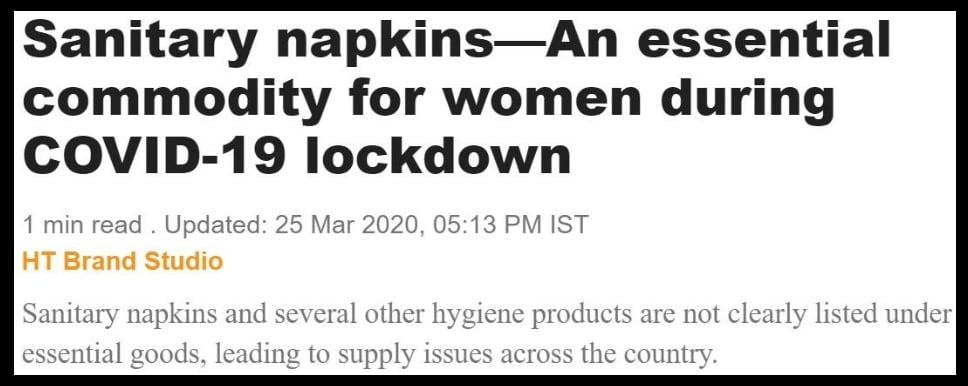
Two female law students petitioned the court to include disposable pads in the Public Distribution System as an essential product. The court responded that it will positively consider this petition. However, the final decision was delayed by an affidavit stating, “The petitioners were making sweeping allegations about the government machinery not functioning properly during the lockdown.” This affidavit was submitted by MoHFW under-secretary Dilip Kumar Sahu.

A number of media outlets were making the connection between the supply cut to the implementation of various government schemes. One major scheme being the Rajiv Gandhi Scheme for Empowerment of Adolescents Girls, by the Women and Child Development Ministry, which states that schools will be a key chain in the distribution of sanitary napkins and MHH – SRSH related knowledge to young girls, 11 to 18 years of age. Anganwadi centres and ASHA Workers are also two other key components in the distribution channel from within the purview of the Health Departments/Ministry.
Also read: Menstruation Is Natural. Myths Around Menstruation Are Social Constructs.
It is interesting that we in fact have a decent distribution mechanism already in place to make disposable pads accessible (if not in emergencies like a pandemic or lockdown) to all. The drop in the production of disposable pads due to lockdown, triggered this crisis, right? But what if there is a way to circumvent these challenges, especially during emergencies? The question is also beyond a supply but establishing a well-oiled humanitarian supply chain that has a gender lens.
The drop in the production of disposable pads due to lockdown, triggered this crisis, right? But what if there is a way to circumvent these challenges, especially during emergencies?
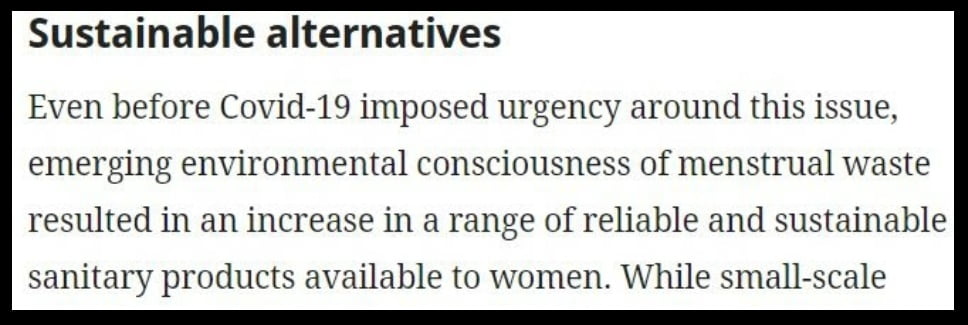
Very few articles have uncovered this aspect to the story. There is also a lack of focus on the plight in disaster/emergency zones and how disposable pads pollute/aggravate the litter. Sustainable alternatives like cloth pads, period panties are all truly most apt for emergencies provided enough IEC and WASH infrastructure is in place, as they can be used and reused for longer periods of time, not including menstrual cups. To be able to unpack this, one has to understand the history of menstrual products in India.
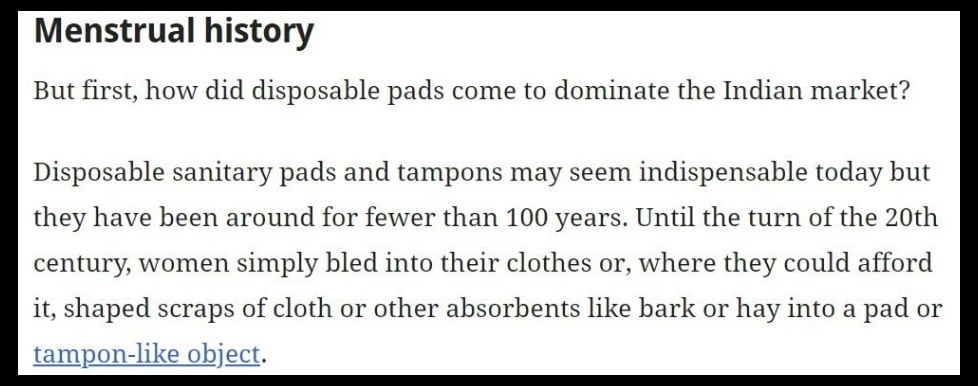
Scroll’s article, tracks the business incentive and the politics behind the success of disposable pads in the market. The product was used to highlight a shift in lifestyle that was desirable. The disposable pads would be advertised as a “modern and efficient” alternative to the “oppressive old ways”. Once one participates in this market, one is stuck in a recurring pattern—a cycle where the “need” was constructed and can be incentivised for decades.
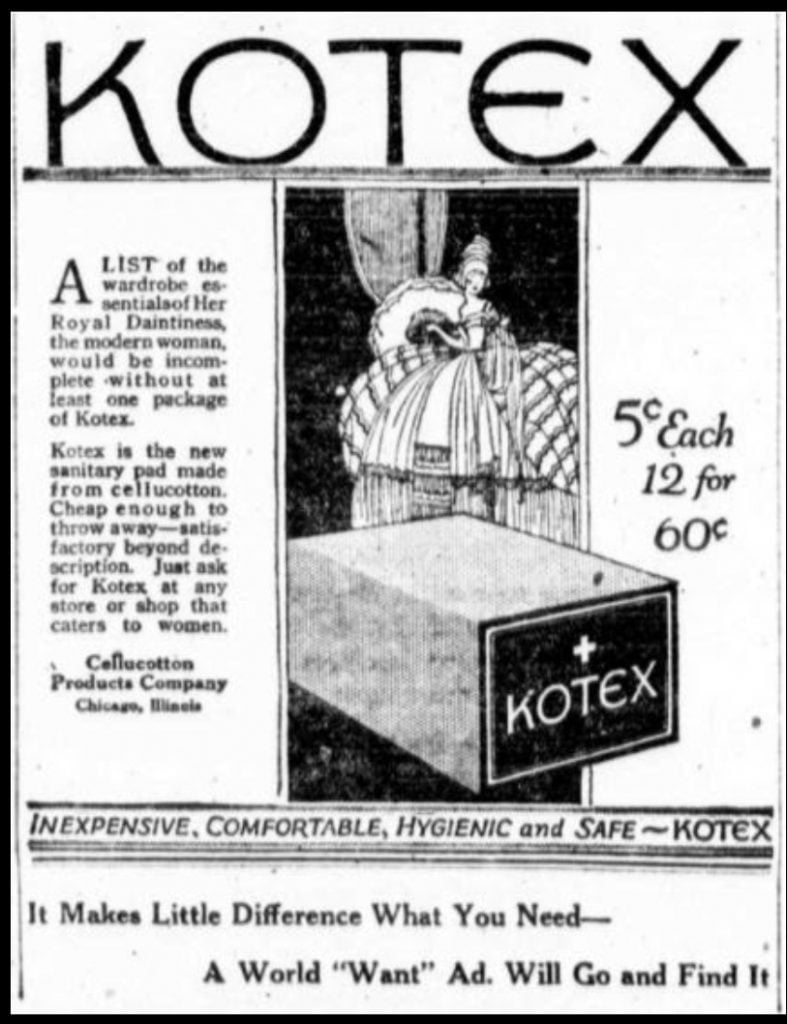
It is time to reevaluate the production and distribution of disposable pads and push for the introduction of sustainable products in government schemes, among a basket, where the focus is still on the informed choice and agency of the beneficiary/consumer.
“If the government does not include sustainable products like cups and cloth pads, it means that it is reluctant to tackle the core of MHH and the taboo surrounding it. Think about it. If people use a cup/cloth pad, they need to touch their blood to wash and reuse. Why isn’t the government ready to use this as an opportunity to let people confront taboos around menstruation? We must get comfortable with our own bodies,” says Namrata, the Co-Founder and Director of Anahat Foundation for Change, Kolkata.
It is also said, “These products promise much for women in poorer regions of the world because they are a much cheaper and environmentally friendly alternative to disposable pads.” Again a problematic way to approach choice based product usage reiterating class based approach to product uptake.
The best way to minimise the blow of uncertainty in terms of inaccessibility or unavailability of MHH products is equipping menstruators with the “information on making, using and maintaining homemade cloth pads safely.” Organisations like Jatan Sansthan provide detailed guidance on homemade cloth pads and their hygienic maintenance.
Further, the media is mostly oblivious to the aspect of the invisible every-month labour of not just bleeding but all the phases of the menstrual cycle, as a preparatory labour that one chooses to exercise to procreate. With the invisibilisation of labour stems the invisibilisation of one’s fundamental and rightful access to knowledge, products and ancillary services. Media outlets that did raise the pertinent point of interrupted disposable pads, in tandem failed to point out the lack of WASH services or undergarments required to even use a disposable pad. The need to report beyond the silos of a crisis that has larger underpinnings to the landscape of experiences, needs to come out more nuanced and elaborately. This could surely influence efforts in developing, designing and implementing programs on MHH itself.
Also read: ‘Period Leave’, Period. Unlearning The Bias Against Menstruation At Workplace
Disposable pads cannot be the band-aid holding together the multiple urgent aspects in the MHH sector. The mainstream media, majorly smoothens the entire discussion around menstruation and MHH by plainly making it a black and white issue, by reporting on the issues that arise more easily. Filling in the grey areas is the only way we can rip the band-aid and start healing the wounds, like the taboo, which will invariably strengthen the whole discussion around the subject and most definitely result in policy change.
With inputs from Pratyusha Varanasi and Bharti Kannan from Boondh
Boondh is a social enterprise working in the space of menstrual health, literacy, policy advocacy, and sustainable products. COVID X Menstruation is a series of articles that explores menstrual health and hygiene along multiple intersections like menstrual programming, product supply, government policies, civil society interventions, mental health, and more. You can follow them on Twitter, Facebook and Instagram.
